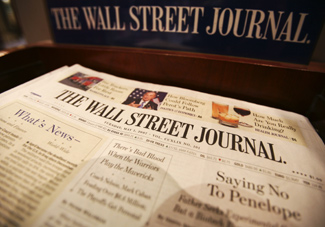| Home | Blog | Ask This | Showcase | Commentary | Comments | About Us | Contributors | Contact Us |

Ian Johnson on why the Bancrofts should turn down MurdochCOMMENTARYThe Wall Street Journal reporter, currently a Nieman fellow who is actively opposing the proposed Dow Jones takeover, asks what might come first for Murdoch: news-gathering integrity or new revenue-enhancing schemes? No points for the correct answer. By Ian Johnson For the past nine months I've been ensconced in Harvard's ivory towers, spending a Nieman fellowship figuring out how I'll cover China when I return there later this year. The news of Rupert Murdoch's efforts to buy Dow Jones, however, has jerked me back to reality and spurred me to join other colleagues in opposing his bid. Many people have a vague idea that Mr. Murdoch has a bad reputation for maintaining journalistic standards, but in China I've seen his efforts first-hand. This is probably a key reason for my opposition. I worked in China from 1994 to 2001. During this time, Mr. Murdoch went from being a critic of Beijing—once famously saying that satellite television would be "an unambiguous threat to totalitarian regimes everywhere"—to an archetypical pro-Beijing businessman. He pulled the BBC from Star TV, for example, and sold the Hong Kong-based South China Morning Post, which until then had often criticized the mainland's human rights record. And of course he killed the memoirs of former Hong Kong governor Chris Patten, who had long been a thorn in Beijing's side. I don't begrudge a businessman trying to pry open the China market. In China, I have to give Mr. Murdoch credit for his efforts--in this he contrasts favorably with Dow Jones' often sleepy efforts to crack the media market. But what worries me as a long-time China correspondent is that Murdoch doesn't separate his business interests from his newsgathering operations. Thus it's quite conceivable, to me at least, that he'd ask senior editors to tone down the China coverage. We've won two Pulitzer prizes there in the past six years for our hard-hitting coverage. He could well view such work as a nuisance. Of course Mr. Murdoch is likely to say that he'll guarantee our editorial independence--he'll make a seemingly commonsensical argument that he doesn't want to kill the goose that lays the golden egg. The problem with this is Dow Jones does not lay golden eggs. The reason it is vulnerable to a takeover is that its profitability is not as high as investors want--this is why its stock price has lagged and the family might entertain an offer. Rather than wanting to adopt a laissez-faire attitude, Mr. Murdoch will have every incentive to try new revenue-enhancing schemes. Those could involve China. What would come first, the Journal's news-gathering integrity or new sources of revenues for a costly but under-performing acquisition? No points for the right answer. That's led me and others to try in our own modest—probably even feeble—ways to oppose the takeover. I and other Journal reporters have written the Bancroft family, which still owns Dow Jones, thanking them for not having yet sold. We hope to encourage them to continue to put up resistance to his advances. The Journal's plight has also attracted the attention of other Nieman fellows. They're also signing a letter asking the family to keep the paper and not sell to Murdoch. Will any of this matter? One of the constant themes we heard during presentations at the Nieman Foundation over the past year was that quality journalism is under threat. I'd judge this year a waste if I didn't make some effort to save the Journal's independence.
|
|




